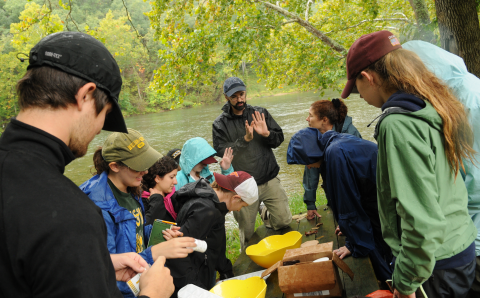
George Mason University has been an NCSE Member Institution for 14 years. Sustainability is a key educational, operational and research priority at Mason. Mason educates sustainability leaders, conducts interdisciplinary research of consequence, invests in green infrastructure, and promotes and supports socially conscious entrepreneurship. Through civic and community engagement in and outside the classroom, Mason offers students a transformative education in programs based within the Department of Environmental Science and Policy (ESP), Atmospheric, Oceanic, and Earth Sciences, Global and Community Health, and the School of Integrative Studies, among others. Mason’s globally-recognized faculty deliver high-level educational experiences, field applications, and leadership in extension and outreach, within one of the most diverse academic communities in America. Building upon strong foundational partnerships and its convenient location, their programs address local, regional and global environmental issues, translating science into policy.
ESP embraces ecosystem health and sustainability as a research and academic focus under the One Health/Planetary Health approaches, demonstrating solutions to pressing issues to policymakers and the general public. ESP focuses on conservation of species and their habitats; ecology of water and watersheds; monitoring and management of environmentally-derived emerging infectious diseases; and the sustainability of socio-ecological systems that support healthy humans, species, and ecosystems. The department delivers 125 “green leaf”-designated sustainability courses across dozens of academic programs. Mason students have directly offered hands-on watershed education programs to over 100,000 middle school youth.
Nine of Mason’s colleges and schools also support research centers that focus on sustainability, including the Potomac Environmental Research and Education Center, the Center for Climate Change Communication, the Business for a Better World Center, and the Center for Energy Science and Policy. With much of its research related to sustainability, Mason recently launched the Institute for a Sustainable Earth to connect faculty with policymakers, businesses, civic organizations, and communities to foster transdisciplinary research. Mason’s Center for Resilient and Sustainable Communities facilitates locally led, bottom-up initiatives supported by effective, replicable models.
The Office of Sustainability provides leadership in environmental, social, and economic stewardship on our campuses and throughout the local and global communities. Mason is committed to achieving carbon neutrality no later than 2050. The Patriot Green Fund has financially supported more than 70 student-led projects, including the first four hives of what became the Honey Bee Initiative (HBI); HBI is managed by the Business for a Better World Center and now has more than 800 hives around the world! Recently, HBI’s work in Colombia was selected as the 15th best overall social and environmental project in Latin America. On campus, students may participate in the Green Residence program, work in the hydroponic greenhouse that supplies microgreens to campus diners, and live in the Environment and Sustainability Living Learning Community.
Did You Know? Mason students can spend a semester at the Smithsonian Conservation Biology Institute. This one-of-a-kind Smithsonian-Mason School of Conservation partnership offers residential programs with Smithsonian scientists where students care for endangered animals and learn how to protect vanishing ecosystems and species.